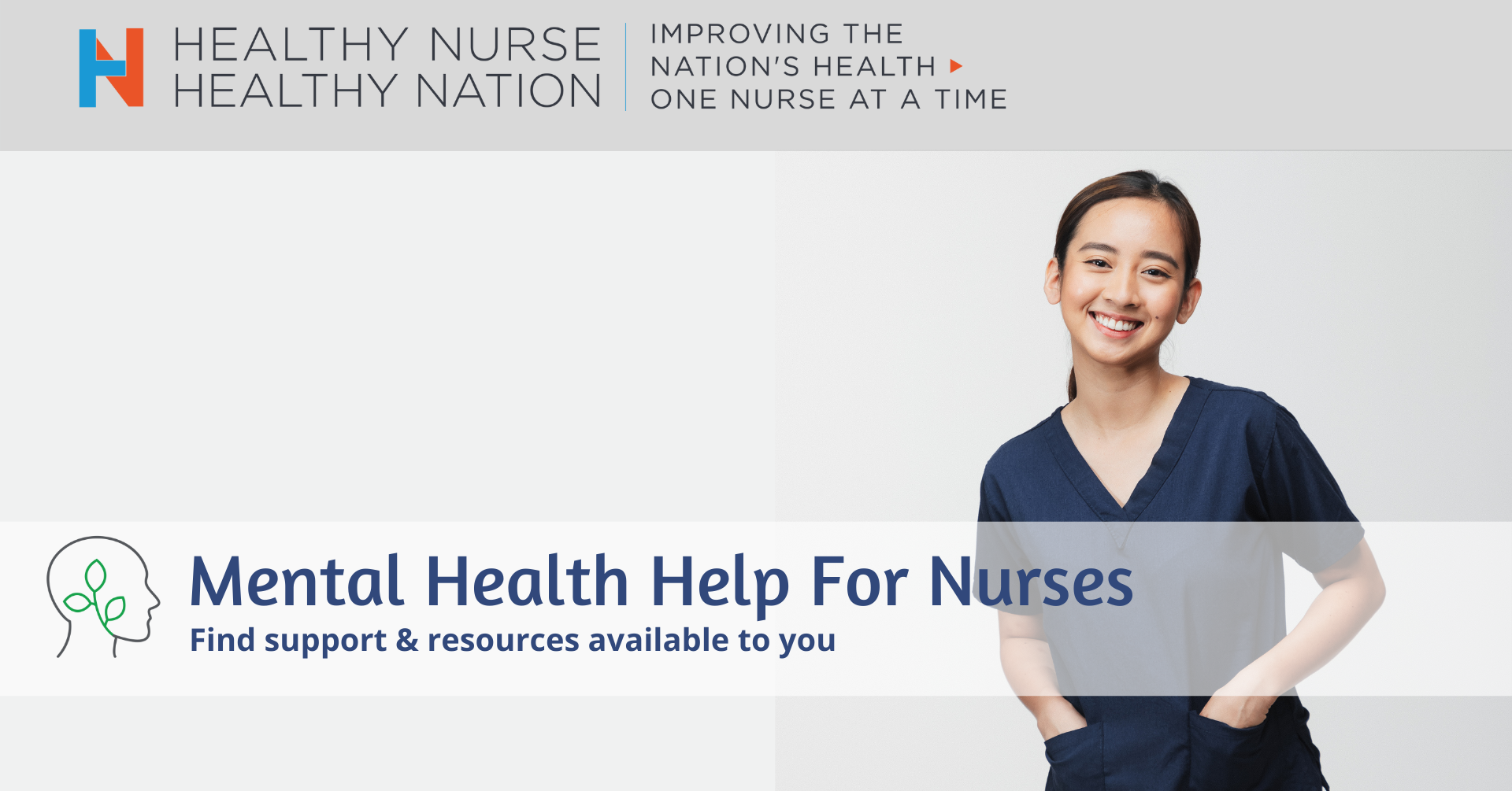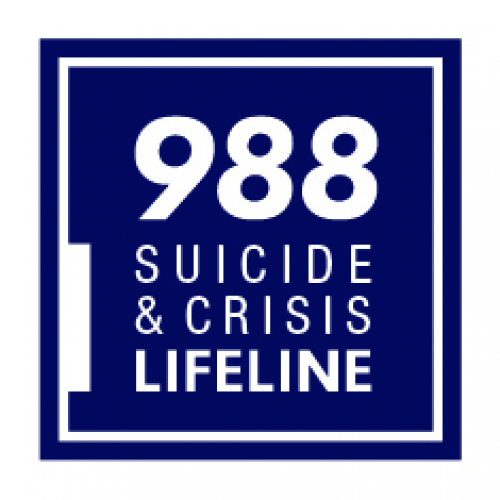Mental Health Help For Nurses
Published
During this unprecedented time of fear and stress, nurses are at high risk for mental health issues like anxiety, depression and post-traumatic stress. Help is available and you are NOT alone. Below are things nurses can do every day to relieve stress and stay well, as well as key additional mental health resources, specifically curated for nurses.
While at work
In panic mode, we instinctively scan the world for threats. Scanning for normalcy breaks that pattern. Note normalcy with the exercise below. Try to do this outside. Do not do this while driving.
Be proactive. If stress, anxiety, fear, rumination or depressed mood is interfering with your functioning consider doing the following:
Mental Health & Stress
Remember this pandemic WILL end. Stay hopeful: there will be silver linings. Your heroic care of others makes the world a better place. ANA Enterprise and Healthy Nurse, Healthy Nation’s Strength through Resiliency Committee salute you!
DISCLAIMER: The content provided on this webpage is general in nature and does not constitute legal or medical advice. This webpage is for reference only. Always consult with a qualified health care provider for any questions you may have regarding thoughts of suicide. If you believe someone is at imminent risk of harming themselves and is refusing help or you have reason to believe someone has harmed themselves, call 911. Laws vary by jurisdiction, locality, state, or country; please follow the laws of your specific jurisdiction and consult with an attorney if you have any questions regarding the laws of your jurisdiction.
ADDITIONAL DISCLAIMER: Programs, resources, or information mentioned or referred to on any webpage are for illustrative purposes only. ANA does not endorse any program, resource or information mentioned or referred to on any webpage.

Have you joined Healthy Nurse, Healthy Nation (HNHN) yet? Join today!
Join our monthly challenges at hnhn.org/challenges
Updated 2/17/22
While at work
- Take back handwashing as your moments of self-care. During the 20 seconds of handwashing recite a meditation or affirmation, sing your favorite song, or pray. Turning these moments into self-care breaks the stress response repeatedly through the shift increasing resilience.
- Take a lap with breath work. When you feel yourself overstressed, take a lap of the department for 1 minute. While walking, breathe in for 4 counts, hold for 7, breathe out for 8. This activates the parasympathetic nervous system, breaking the stress cycle. If you notice a colleague tipping over the edge, tap them out and take a lap together. Talk them through the breath work.
In panic mode, we instinctively scan the world for threats. Scanning for normalcy breaks that pattern. Note normalcy with the exercise below. Try to do this outside. Do not do this while driving.
- Start with your head to the left.
- Slowly turn your head to the right. While turning your head, note everything normal you see and then everything beautiful: (ie. the sky, a tree, a bird, a flower, the leaves, etc). Turning the head activates the vagus nerve to break the stress response.
- Meditate or listen to your favorite music prior to sleep. The last things you listen to will embed in the brain. You need sleep to repair your immune system and nervous system. Do not listen to the news just before bed.
- Get seven or more hours of sleep in a 24-hour period.
- Start each day with reflections of gratitude.
- Read 5 minutes in a positive book every morning.
- Focus on things you can control, not those you can’t.
- Take 5 slow deep breaths regularly throughout the day.
- Exercise; even a short brisk 10 minute walk can help.
- Hydrate adequately with eight 8 oz glasses of water a day.
- Eat light and often; at least 5 fruits and vegetables per day.
- Limit alcohol consumption to one drink a day or avoid it completely.
- Spend some time outdoors safely while noting normalcy.
- Connect with family and friends while maintaining physical distancing. It is especially refreshing if you can see their faces via an electronic device.
- Hobby, craft, bake, write letters, journal, scrapbook.
- Stay informed, but limit your time with COVID-19 news and updates.
- Pray, meditate, practice mindfulness (be here now!)
- Write down 3 people/things that you are grateful for every day.
- Catch negative thoughts and overturn them to positive; stay hopeful.
- Practice yoga, Emotional Freedom Techniques, or other stress alleviators.
- Participate in virtual support groups and chats from your state nurses associations, specialty organizations, Facebook groups, and others.
- Take time for yourself, doing something you really enjoy, every day. Read a rag mag, watch an old sports program, power nap, skype your baby nephew-you decide!
Be proactive. If stress, anxiety, fear, rumination or depressed mood is interfering with your functioning consider doing the following:
- Contact your organization’s EAP (employee assistance program).
- Explore tele-mental health options through your insurance and contact your healthcare provider for options. Prepare yourself with how to get help before you need it.
- Participate in mental health screening if offered by your employer and seek support as needed. Do not wait until you are in crisis.
- If you have thoughts of suicide or self-harm, call or text the National Suicide Prevention Lifeline at 988. A chat is also available at 988lifeline.org. You are not alone. Please reach out.
- Provide mental health screening. See UCSD Health’s program for an excellent example. Contact info@afsp.org to start a screening program.
- Offer evidence-based programs that prevent and decrease anxiety and depression. Your employees need them. See The Ohio State University College of Nursing’s MINDBODYSTRONG program as an example.
- Expand and add to existing mental health and resiliency resources. Pop up programs, online therapists, support groups, hope huddles, increased wellness and mental health staff and enhanced telehealth options are possibilities.
- Consider activating a caregiver response team of emotional first-aiders.
- Celebrate victories no matter how small. Start a process to celebrate innovations in crisis; care modifications made in the moment to overcome obstacles to care.
- Honor, thank, appreciate, and recognize your nurses.
- Join ANA Enterprise’s Healthy Nurse, Healthy Nation (HNHN), a FREE nurse wellness program where all are welcome. Multiple self-care resources can be found, including our monthly health challenges.
- Read more mental health blogs here.
- Get the mindfulness app Headspace at no cost.
Mental Health & Stress
- American Psychiatric Nurses Association's Managing Stress & Self Care during COVID-19: Information for Nurses
- ANA Enterprise's Well-being Initiative
- ANA's Nurse Suicide Prevention/Resilience webpages
- HNHN blog Six Tips for Nurses Coping with the COVID-19 Pandemic
- The Ohio State University’s (OSU) COVID-19 Resources, including video on coping by Chief Wellness Officer Dr. Bernadette Melnyk
- OSU 8 week online series: Staying Calm and Well in the Midst of the COVID-19 Storm
- American Holistic Nurses Association’s Stress Management website
- The National Academy of Medicine’s Action Collaborative on Clinician Well-being's Resources to Support the Health and Well-Being of Clinicians During the COVID-19 Outbreak
- American Nurse article “Wellness 101: 9 Dimensions of Wellness”
- Nursing@Georgetown’s blog “How Nurses Can Protect Themselves as They Work to Save Others”
- NIOSH Science Blog Managing Fatigue During Times of Crisis: Guidance for Nurses, Managers, and Other Healthcare Workers
- Nurses House - A national fund for nurses in need
- American Nurse article “Grief Management After a Nurse’s Death”
- HNHN blog “The Tough Stuff: How to Deal With the Death of a Patient”
- AHNA's virtual "Compassionate Listening Circles" (scroll about a third down the webpage)
- American Journal of Nursing & Johns Hopkins School of Nursing's Frontline Nurses WikiWisdom Forum - a place to share nurse knowledge, challenges, and more.
- From the Well-Being Initiative - Nurses Together: Connecting through Conversations - one hour sessions led by volunteers from the Emergency Nurses Association.
- National Suicide Prevention Lifeline All or text 988. A chat is also available at 988lifeline.org.
- SAMHSA National Helpline 1-800-662 HELP (4357)
- SAMHSA Disaster Distress Helpline 1-800-985-5990
- CDC’s Information for Healthcare Professionals about Coronavirus (COVID-19)
- ANA’s COVID-19 Resource Center
Remember this pandemic WILL end. Stay hopeful: there will be silver linings. Your heroic care of others makes the world a better place. ANA Enterprise and Healthy Nurse, Healthy Nation’s Strength through Resiliency Committee salute you!
DISCLAIMER: The content provided on this webpage is general in nature and does not constitute legal or medical advice. This webpage is for reference only. Always consult with a qualified health care provider for any questions you may have regarding thoughts of suicide. If you believe someone is at imminent risk of harming themselves and is refusing help or you have reason to believe someone has harmed themselves, call 911. Laws vary by jurisdiction, locality, state, or country; please follow the laws of your specific jurisdiction and consult with an attorney if you have any questions regarding the laws of your jurisdiction.
ADDITIONAL DISCLAIMER: Programs, resources, or information mentioned or referred to on any webpage are for illustrative purposes only. ANA does not endorse any program, resource or information mentioned or referred to on any webpage.

Have you joined Healthy Nurse, Healthy Nation (HNHN) yet? Join today!
Join our monthly challenges at hnhn.org/challenges
Updated 2/17/22
Blog Mental Health
07/06/2022 12:38pm CDT




Post a Comment or Question